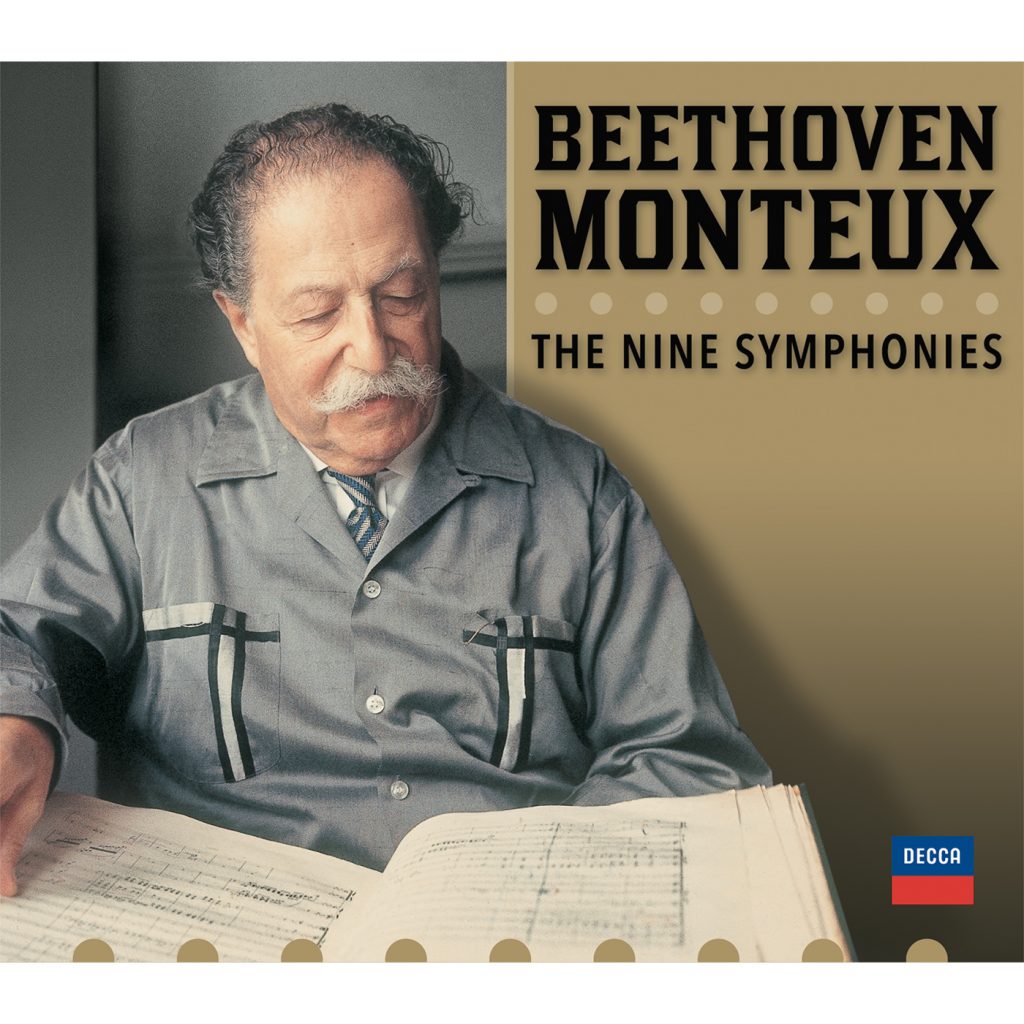Monteux’s Beethoven has been described as visionary. Respect for the spirit of the score, directness of expression, exceptionally well-drilled playing and a sense of untainted idealism that lay at the very heart of the composer’s vision – these are the qualities that typify Monteux’s interpretation of Beethoven. Eight of the symphonies were recorded for Decca; the Ninth for Westminster; and the third (Eroica) again, for Philips. Together with the rehearsal for the Ninth and an impromptu in-studio performance of ‘La Marseillaise’, they form the most complete collection of Monteux’s Beethoven recordings. Other conductors may have offered a more personalised take on the music but none made it more universal or more human. The fascinating accompanying notes to the set are by Rob Cowan and the recordings have been remastered for this release.
LUDWIG VAN BEETHOVEN
Symphony Nos. 1–9
Fidelio: Overture
Egmont: Overture
König Stephan: Overture
Symphony No. 9 – Rehearsal
La Marseillaise (Rouget de Lisle)
Elisabeth Söderström
Regina Resnik
Jon Vickers
David Ward
London Bach Choir (No. 9)
London Symphony Orchestra (Nos. 2, 4, 5, 7, 9, Overtures)
Wiener Philharmoniker (Nos. 1, 3, 6, 8)
Concertgebouworkest (No. 3; additional performance)
Pierre Monteux
Recording Producers: John Culshaw (Nos. 2, 6, Fidelio, König Stephan); John Culshaw, Erik Smith (Nos. 1, 3: Wiener Philharmoniker, 4, 5, 7, Egmont); Christopher Raeburn, John Culshaw (No. 8); Kurt List, Peter Higgins (No. 9: performance and rehearsal, La Marseillaise); Jaap van Ginneken (No. 3: Concertgebouworkest)
Balance Engineers: Gordon Parry, James Brown (Nos. 3: Wiener Philharmoniker, 6, 8); Kenneth Wilkinson (Nos. 2, 4, Fidelio, König Stephan); Ken Cress, Alan Reeve (Nos. 5, 7, Egmont); James Brown (No. 1); Adolf Enz, Raymond Füglistaler (No. 9: performance and rehearsal, La Marseillaise); Henk Jansen, Co Witteveen (No. 3: Concertgebouworkest)
Recording Locations: Kingsway Hall, London, UK, 15–16 October 1959 (No. 4), 9–10 May 1960 (No. 2, Fidelio, König Stephan), 23–27 May 1961 (Nos. 5, 7, Egmont); Sofiensaal, Vienna, Austria, 2–3 December 1957 (No. 3: Wiener Philharmoniker), 29–31 October 1958 (No. 6), 15 & 22 April 1959 (No. 8), 20–24 April 1960 (No. 1); Walthamstow Assembly Hall, London, UK, 11–13 & 18 June 1962 (No. 9: performance and rehearsal, La Marseillaise); Grote Zaal, Concertgebouw, Amsterdam, The Netherlands, 1–3 July 1962 (No. 3: Concertgebouworkest)
Remastering: Chris Bernauer
‘the development has genuine tension, accents are light and the strings have just the right weight of tone […] the playing of the Vienna strings is splendidly alert and sensitive’ (Nos. 1 & 8) Gramophone
‘Monteux’s version of Beethoven’s Second Symphony is immensely likeable and I cannot think of another version more liveable with. It has freshness and buoyancy […] The sound too is admirable – clear and lively, yet truthful in perspective and with no lack of body.’ (No. 2) Gramophone, March 1982
‘the first movement has a genuine sense of flow […] The Decca transfer is smoother than the RCA original’ (No. 3) Gramophone, July 1971
‘straightforward and lively, very well played … the performance communicates a genuine sense of enjoyment’ (No. 4) Gramophone
‘this is a performance I shall come back to often. It is definitely among the Ninths that count’ (No. 9) Musicweb International
‘the sound is excellent […] the finale has beautifully light pointing and delicate playing from the Vienna Philharmonic’ (No. 6) Gramophone
‘A lively, slightly lightweight performance, reaching its zenith in the finale […] the recording is bright and quite full’ (No. 7) Gramophone

